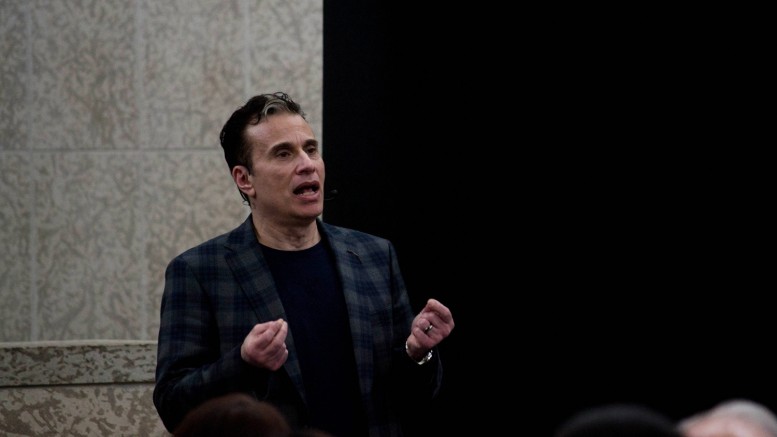Michael Landsberg – host of TSN’s Off the Record and ambassador for the Bell Let’s Talk mental health awareness campaign – spoke to University of Manitoba students Nov. 18 as part of UMSU’s 2015-16 Speaker Series.
The second guest of the student union’s series, Landsberg was brought in to encourage dialogue surrounding mental illness as part of UMSU’s broader Mental Health and Wellness strategy.
The television personality has himself battled depression and was honest about his struggles – something that gave a few students in attendance the confidence to open up as well.
After Landsberg’s talk was finished, the Manitoban had the opportunity to ask him a few direct questions regarding mental health.
Desensitization
One of the major talking points Landsberg brought up was society’s dialogue, and being able to desensitize people toward the discussion of mental illness.
“I think it’s incredibly difficult to educate the uneducated – and I’m not talking about school education,” Landsberg said. “When you have a bias, when you believe in the stigma, you have this wall around you that doesn’t accept the facts.”
Further to his point on education, Landsberg noted the difficulty expressing a struggle with mental illness to loved ones or friends due to a lack of outward evidence when compared to other forms of sickness, such as Parkinson’s disease – a progressive disorder within the nervous system which affects movement.
“I could make a really compelling argument to anyone that mental illness – depression, anxiety, or panic disorder – are illnesses just like, for instance Parkinson’s, right,” he said. “That’s a brain disease. Why is depression not called a brain disease? It’s called a mental illness.”
“So I could make all these compelling arguments, but it’s tough, because people want to believe. There’s actually this aspect of [mental illness] where [individuals] want to blame people for their illness because you can’t ever prove it to people.”
Linking back to the concept of proof, Landsberg added that a lack of evidence has forced individuals to keep their struggles hidden at times.
“Unlike any other illness, people deny themselves help,” he said.“This is the illness that people say ‘okay, I get it but come on, you’ve got a great job, you’ve got a great family.’ That’s what this illness is. That’s why people keep it to themselves, they buy into the stigma.”
Public health system
Landsberg also gave his opinion on the quality of service provided by the public health system in relation to mental illness – especially pertinent in the wake of the recent case concerning Reid Bricker, a 33-year-old Winnipeg man who has been missing for more than a month after being discharged from the Health Sciences Centre following a suicide attempt.
“[Public health] is better in the big cities,” he said. “It’s better in Winnipeg than it would be in smaller communities.”
“A lot of smaller communities don’t even have a psychiatrist and that’s who you want treating your mental illness. You want someone who just does that because your psychiatrist instincts often determine the quality of your care.”
At the same time, Landsberg said the system needs improvement.
“Our system is terrible, it’s way deficient,” he said. “I think the key is not to blame the doctor in the system, who’s in the emergency room who has to make the call, but you blame the system that doesn’t give him the resources to err on the side of caution.”
Landsberg added, however, that doctors at times have a tendency to undervalue the needs of a patient with mental illness in favour of what might benefit the system.
“I would say that doctors all the time make decisions based not on what’s 100 per cent best for the patient but they make decisions based on what’s best for the patient and for the system. There’s just not enough to go around.”
Landsberg finished things up by giving his opinion on the recent announcement of a fall reading week, which will be introduced at the U of M for the first time in the 2016-17 school year and was rolled out as part of UMSU’s mental health campaign.
“How could you make the case that it’s a bad thing?” he asked. “I think that’s really how I look at it. Is it a good thing? I don’t know but it’s not a bad thing. Is it going to help someone? Yeah, probably. Is it an all-encompassing answer? No, of course not.
“I think it’s not so much the decision to go for the week, it’s the decision to address the problem that’s so important,” he said, noting students’ mental health can deteriorate while at school.
“If you say, ‘well, we’re all about attacking that problem,’ than I think you’re taking a huge step towards making a difference.”



